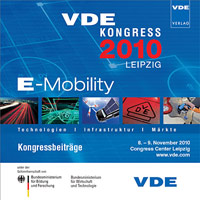Benefit of a Simulation Model of a Decentralized Energy Management System for Electric Vehicle Charging
Konferenz: VDE-Kongress 2010 - E-Mobility: Technologien - Infrastruktur - Märkte
08.11.2010 - 09.11.2010 in Leipzig, Deutschland
Tagungsband: VDE-Kongress 2010
Seiten: 7Sprache: EnglischTyp: PDF
Persönliche VDE-Mitglieder erhalten auf diesen Artikel 10% Rabatt
Autoren:
Wickert, Manuel; Baier, André; Lichtner, Patrick; Prior, Johannes (Fraunhofer IWES, Kassel, Germany)
Inhalt:
In times of ever increasing power feed-in from fluctuating renewable power sources like wind and solar power it increases the need for more storage capacity to compensate such fluctuations. Electric vehicles (EVs) are often described as a possible way to provide this storage capacity. To make the storage of EVs available in a reasonable manner an energy management system is needed. In our research projects RegModHarz and Harz. EE-mobility it is analysed how electrical vehicles can support higher renewable energy integration for the rural region Harz. This model region is also subject of the presented work. In this paper an agent based simulation model for EVs is presented to show the impact of managed EV charging. The model has three main focuses. At first the model must reproduce reasonable user behaviour like driving characteristics. The second focus is to model the electrical characteristics of the EV. In last focus is the simulation of a decentralized EV energy management. We present a modular and extendable simulation framework with which we are able to model a precise simulation of a great amount of EVs for the region Harz. With a detailed EV Simulation model we are able to display that EV will produce seasonal dependent energy consumption. We show that a decentralized load management of these EVs reduces residual load fluctuations and therefore helps to increase the integration of renewable energy into the grid.


